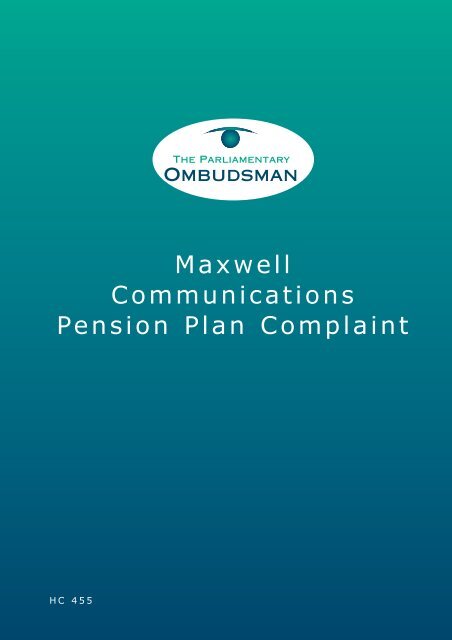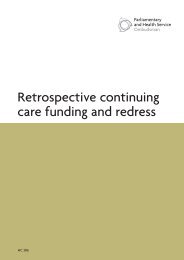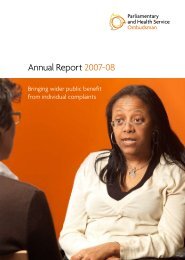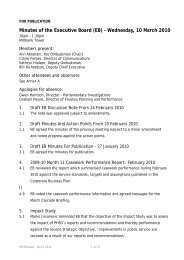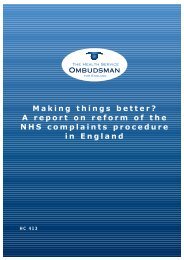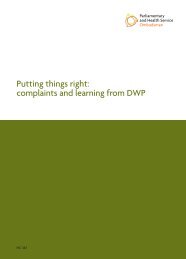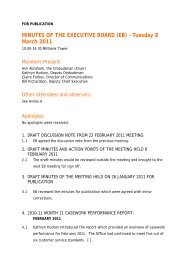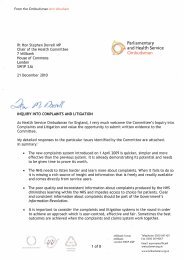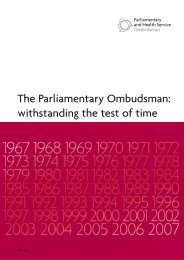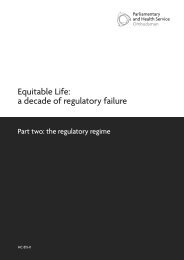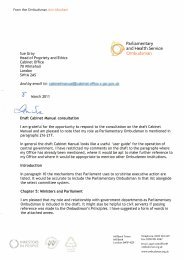Maxwell Communications Pension Plan Complaint - the ...
Maxwell Communications Pension Plan Complaint - the ...
Maxwell Communications Pension Plan Complaint - the ...
Create successful ePaper yourself
Turn your PDF publications into a flip-book with our unique Google optimized e-Paper software.
The ParliamentaryOmbudsman<strong>Maxwell</strong><strong>Communications</strong><strong>Pension</strong> <strong>Plan</strong> <strong>Complaint</strong>HC 455
The ParliamentaryOmbudsman<strong>Maxwell</strong> <strong>Communications</strong> <strong>Pension</strong><strong>Plan</strong> <strong>Complaint</strong>1st REPORT – SESSION 2004-2005Presented to Parliament Pursuant to Section 10(4)of <strong>the</strong> Parliamentary Commissioner Act 1967Ordered byThe House of CommonsTo be printed on23 March 2005HC 455 London : The Stationery Office£4.25
ContentsPageForeword by <strong>the</strong> Parliamentary OmbudsmanivChapter 1Summary 1Chapter 2Full report 2Background 2The complaint 2Key events 2Relevant legislation 3Jurisdiction 3Ga<strong>the</strong>ring <strong>the</strong> evidence 3The Ombudsman’s decisions 4Reasons for <strong>the</strong> decisions 4<strong>Complaint</strong> of maladministration by <strong>the</strong> UnitRecycling of State Scheme <strong>Pension</strong>s (SSPs)DelayConclusion 7March 2005 • <strong>Maxwell</strong> <strong>Communications</strong> <strong>Pension</strong> <strong>Plan</strong> <strong>Complaint</strong>iii
ForewordI am laying before Parliament under section 10(4) of <strong>the</strong> ParliamentaryCommissioner Act 1967 this report, which contains <strong>the</strong> results of my Office’sinvestigation into a complaint that <strong>the</strong> Department of Social Security and,subsequently, <strong>the</strong> Department for Work and <strong>Pension</strong>s failed properly to overseeand administer <strong>the</strong> distribution of money collected from financial institutions for<strong>the</strong> benefit of certain <strong>Maxwell</strong> pensioners; that <strong>the</strong> Department later unreasonablyrefused to give financial assistance to some of those pensioners; and that <strong>the</strong>ytook too long to reach that decision.The complaint, referred by Mr Mark Oaten MP, was from a member of <strong>the</strong><strong>Maxwell</strong> <strong>Communications</strong> <strong>Pension</strong> <strong>Plan</strong> who complained that <strong>the</strong> <strong>Plan</strong> hadreceived too small a share of <strong>the</strong> £276 million that had been collected and that,by <strong>the</strong> time <strong>the</strong> Department decided that <strong>the</strong>y would not assist <strong>the</strong> <strong>Plan</strong> fur<strong>the</strong>r,<strong>the</strong> <strong>Plan</strong>'s financial position had deteriorated.A recent Early Day Motion on <strong>the</strong> subject attracted over 100 signatures and, inview of that wider interest, I have decided to issue this report.Ann AbrahamParliamentary OmbudsmanMarch 2005iv • <strong>Maxwell</strong> <strong>Communications</strong> <strong>Pension</strong> <strong>Plan</strong> <strong>Complaint</strong> • March 2005
Chapter 1. Summary1. Mr A made three complaints.That <strong>the</strong> <strong>Maxwell</strong> <strong>Pension</strong>s Unit,which had been set up by <strong>the</strong>Department of Social Security (DSS)failed properly to oversee andadminister <strong>the</strong> distribution of £276million collected from financialinstitutions for <strong>the</strong> benefit of certain<strong>Maxwell</strong> pensioners, with <strong>the</strong> resultthat <strong>the</strong> <strong>Maxwell</strong> <strong>Communications</strong><strong>Pension</strong> <strong>Plan</strong> (<strong>the</strong> <strong>Plan</strong>), of which heis a member, received an unfairlysmall share.That <strong>the</strong> Department for Work and<strong>Pension</strong>s (DWP) acted unreasonablyin refusing to give fur<strong>the</strong>r financialassistance to <strong>the</strong> <strong>Plan</strong>. (TheSecretary of State had previouslyagreed to postpone collection ofcertain amounts owed to <strong>the</strong> NationalInsurance Fund.)That DWP took too long to make thatdecision.2. We found that, while <strong>the</strong> <strong>Maxwell</strong><strong>Pension</strong>s Unit had been part of DSS andexercised some administrative functionson behalf of that Department, albeit atarms length, <strong>the</strong> distribution of <strong>the</strong> £276million had not been an administrativefunction of <strong>the</strong> Department and was,<strong>the</strong>refore, outside <strong>the</strong> Ombudsman'sjurisdiction.4. We found that DWP did not takean unreasonably long time to deal with<strong>the</strong> <strong>Plan</strong>’s request for financial assistance.On that basis, we do not consider that<strong>the</strong>ir handling of <strong>the</strong> request wasmaladministrative. There were matters ofdetail that had to be sorted out before<strong>the</strong>y could consider whe<strong>the</strong>r or notfur<strong>the</strong>r Government money should bemade available. Officials needed to ensurethat Ministers had all of <strong>the</strong> necessaryinformation before asking <strong>the</strong>m to make adecision and, in particular, <strong>the</strong>y had toensure that <strong>the</strong> implications of <strong>the</strong>decision were taken fully into account.Such a significant and politically sensitivedecision could not be taken lightly or veryquickly.5. While we sympathise with <strong>the</strong>predicament in which <strong>the</strong> <strong>Plan</strong>'s membersnow find <strong>the</strong>mselves, we have seen noevidence that it was caused bymaladministration on <strong>the</strong> part ofDSS/DWP.3. We did not consider that DWPacted unreasonably in refusing financialassistance to <strong>the</strong> <strong>Plan</strong>. The Secretary ofState could not implement <strong>the</strong> <strong>Plan</strong>'sproposal to 'recycle' payments made to<strong>the</strong> National Insurance Fund by o<strong>the</strong>rpension schemes for <strong>the</strong> benefit of <strong>the</strong><strong>Plan</strong>. The Government had made clear, at<strong>the</strong> outset, that it was not obliged to usetaxpayers’ money to make good lossesresulting from <strong>the</strong> fraudulent misuse ofpension funds. The Secretary of State'ssubsequent refusal to provide financialassistance to <strong>the</strong> <strong>Plan</strong> was consistent withthat policy. We cannot question <strong>the</strong> meritsof decisions taken properly in line withGovernment policy.• <strong>Maxwell</strong> <strong>Communications</strong> <strong>Pension</strong> <strong>Plan</strong> <strong>Complaint</strong> • March 2005 1
Chapter 2. Full reportBackground6. In December 1991, after <strong>the</strong> deathof Robert <strong>Maxwell</strong>, a shortfall of £450million came to light in <strong>Maxwell</strong>companies’ pension schemes. It wasdiscovered that <strong>the</strong> schemes were notable to meet in full <strong>the</strong>ir future financialcommitments, for example, to pay outemployees’ pensions. In 1995 an out ofcourt settlement, known as <strong>the</strong> 'MajorSettlement’, was reached, distributing£276 million amongst four separate<strong>Maxwell</strong> pensions schemes (<strong>the</strong>Schemes).The complaint7. Mr A complained that <strong>the</strong> <strong>Maxwell</strong><strong>Pension</strong>s Unit (<strong>the</strong> Unit), set up by <strong>the</strong>Department of Social Security (DSS),failed properly to oversee and administer<strong>the</strong> distribution of <strong>the</strong> Major Settlement,with <strong>the</strong> result that <strong>the</strong> <strong>Maxwell</strong><strong>Communications</strong> <strong>Pension</strong> <strong>Plan</strong> (<strong>the</strong> <strong>Plan</strong>),of which he is a member, received anunfairly small share of <strong>the</strong> availablemoney. (The <strong>Plan</strong> received £44 million,£3 million short of its bid.) Mr Acomplained that <strong>the</strong> Unit failed toexercise due care and did not ensure thateach of <strong>the</strong> Schemes constructed <strong>the</strong>ir bidon a similar basis.8. complained of delay by DSS, andlater by <strong>the</strong> Department for Work and<strong>Pension</strong>s (DWP), which took over DSS'sresponsibilities in June 2001, in reachinga decision on a request, made by <strong>the</strong><strong>Plan</strong>'s trustees (The Law Debenture TrustCorporation – LDTC), for <strong>the</strong> Governmentto ‘recycle’ to <strong>the</strong>m £30.5 million of statescheme premiums (SSPs) paid to <strong>the</strong>Government by one of <strong>the</strong> o<strong>the</strong>r Schemes(Scheme X) to have benefited from <strong>the</strong>Major Settlement. He said thatdiscussions with DSS and DWP hadcontinued for three and a half years,during which time <strong>the</strong> Department hadgiven <strong>the</strong> impression that a positiveconclusion was likely. DWP had eventuallyrefused <strong>the</strong> request, by which time <strong>the</strong>financial position of <strong>the</strong> <strong>Plan</strong> hadworsened considerably. Mr A describedDWP’s decision as petty andunreasonable.Key events9. On 8 June 1992 <strong>the</strong> Secretary ofState for Social Security made astatement in <strong>the</strong> House of Commonsabout <strong>the</strong> plight of <strong>the</strong> <strong>Maxwell</strong>pensioners. Among o<strong>the</strong>r things, he saidthat he was setting up a ‘special unit in[his] Department' to 'work alongside <strong>the</strong>trustees and o<strong>the</strong>rs seeking to secure <strong>the</strong>return of assets and <strong>the</strong>ir equitabledistribution between <strong>the</strong> schemes.’ Hesaid that <strong>the</strong> Unit would administer a£2.5 million emergency fund, usingGovernment funds, to help keep pensionsin payment in <strong>the</strong> short term. Paymentsfrom <strong>the</strong> emergency fund wererefundable.10. The <strong>Maxwell</strong> <strong>Pension</strong>ers Trust (<strong>the</strong>Trust) was set up on 17 July 1992 tomanage a trust fund to which Cityinstitutions contributed for <strong>the</strong> benefit of<strong>Maxwell</strong> pensioners. The Trust waschaired by Sir John (now Lord) Cuckney.Over <strong>the</strong> next couple of years <strong>the</strong> Trustga<strong>the</strong>red a fund of some £6 million, whichwas distributed by <strong>the</strong> Trustees. (Theallocation of that money by <strong>the</strong> Trusteesis not part of <strong>the</strong> complaint.)11. Although in January 1993 a SocialSecurity Select Committee hadrecommended that Lord Cuckney shouldact as mediator, he was not initiallyinvolved in <strong>the</strong> attempts to broker out ofcourt settlements between <strong>the</strong> Schemesand those institutions against which <strong>the</strong>Schemes had potential legal claims.Instead, that work was taken forward by aHigh Court judge, with a particular interestin mediation, who attempted to broker aseries of deals, known as <strong>the</strong> GlobalSettlement, in return for <strong>the</strong> dropping ofall claims against <strong>the</strong> financial institutionswhich were to be party to <strong>the</strong> settlement.12. When <strong>the</strong> Global Settlement talksfoundered in December 1994, LordCuckney was invited – by some of <strong>the</strong>parties to those talks – to try to take <strong>the</strong>matter forward. On 19 January 1995 hewas released from his appointment asChairman and Trustee of <strong>the</strong> Trust. On 24January 1995 Lord Cuckney wrote to <strong>the</strong>representatives of <strong>the</strong> Schemes, declaringhis position as adviser to <strong>the</strong> Secretary of2 March 2005 • <strong>Maxwell</strong> <strong>Communications</strong> <strong>Pension</strong> <strong>Plan</strong> <strong>Complaint</strong> •
State for Social Security on <strong>the</strong> <strong>Maxwell</strong>pensions affair and saying that, with <strong>the</strong>Secretary of State's support, he hadaccepted an invitation from <strong>the</strong> partiesinvolved to try to build on <strong>the</strong> worktowards a Global Settlement. He said tha<strong>the</strong> was not privy to <strong>the</strong> details of <strong>the</strong>negotiations that had already taken placeor to <strong>the</strong> papers about those negotiations.He stressed that he did not see his roleas that of a true mediator, ra<strong>the</strong>r he coulddo ‘no more than help <strong>the</strong> parties toreach agreement among <strong>the</strong>mselves.’Over <strong>the</strong> next few months a settlement,known as <strong>the</strong> Major Settlement, worth£276 million, was reached.Relevant legislation13. When a pension scheme, whichhad been contracted out of <strong>the</strong> StateEarnings Related <strong>Pension</strong> Scheme(SERPS), contracts back into SERPS, <strong>the</strong>national insurance contributions thatwould have been payable but for <strong>the</strong>contracting out fall due to <strong>the</strong> NationalInsurance Fund by way of SSPs. Theliability to pay such SSPs is a priority debtand, in normal circumstances, is payablebefore o<strong>the</strong>r liabilities, such as those to<strong>the</strong> scheme’s beneficiaries. However,Regulation 20 of <strong>the</strong> Occupational <strong>Pension</strong>Schemes (Contracting Out) Regulations1984 gives <strong>the</strong> Secretary of State <strong>the</strong>power to postpone <strong>the</strong> collection of SSPsif he considers that collection would beprejudicial to <strong>the</strong> interests of <strong>the</strong>scheme’s members. That power isdiscretionary. (Although those regulationswere revoked with effect from April 1997,regulation 20 remains in effect. 1 )Jurisdiction14. Section 5(1) of <strong>the</strong> ParliamentaryCommissioner Act 1967 (<strong>the</strong> Act) limits<strong>the</strong> Ombudsman’s jurisdiction to <strong>the</strong>investigation of ‘action being taken in <strong>the</strong>exercise of administrative functions’ ofbodies listed in Schedule 2 to <strong>the</strong> Act.The Ombudsman cannot investigate <strong>the</strong>actions of a body not listed in Schedule 2,nor can she investigate <strong>the</strong> actions of aSchedule 2 body o<strong>the</strong>r than those takenin exercise of that body’s administrativefunctions. DSS was, and DWP is, listed inSchedule 2 to <strong>the</strong> Act. The Ombudsmancannot question <strong>the</strong> contents oflegislation or <strong>the</strong> merits of governmentpolicy.15. The Trust was a private noncharitabletrust, with its own legalidentity. It was not listed in Schedule 2to <strong>the</strong> Act and is not, <strong>the</strong>refore, within<strong>the</strong> Ombudsman's jurisdiction.16. The administrative actions of <strong>the</strong>Secretary of State for Social Security arewithin <strong>the</strong> Ombudsman’s jurisdiction. TheTrust Deed recognised <strong>the</strong> Secretary ofState for Social Security as a ‘specifiedperson’, giving him certain powers, forexample to change <strong>the</strong> name of <strong>the</strong> Trust,to amend or add to <strong>the</strong> schedule defining<strong>the</strong> considerations to be taken intoaccount when disbursing funds (Schedule2 of <strong>the</strong> Trust Deed), and to requirewritten reports. However, <strong>the</strong> Trusteeshad absolute discretion in <strong>the</strong>disbursement of <strong>the</strong> Trust's funds subjectto <strong>the</strong> constraints of Schedule 2 of <strong>the</strong>Trust Deed.Ga<strong>the</strong>ring <strong>the</strong> evidence17. DWP were unable to providepapers in connection with <strong>the</strong> distributionof <strong>the</strong> £276 million. They told us thatLord Cuckney’s negotiations to achieve<strong>the</strong> Major Settlement had beenconfidential, and DSS had not been privyto his discussions or to <strong>the</strong> mechanics of<strong>the</strong> allocation of <strong>the</strong> money; <strong>the</strong>y did not,<strong>the</strong>refore, have any papers to give us.However, <strong>the</strong>y were able to provide somegeneral background information and toanswer some of our questions byspeaking to staff who had been employedin <strong>the</strong> Unit at <strong>the</strong> relevant time. Thecomplainant and his representative kindlyprovided some papers but, given that<strong>the</strong>y had not been directly involved in <strong>the</strong>administration of <strong>the</strong> <strong>Plan</strong>, <strong>the</strong>ir ability toprovide more detailed information was,understandably, limited. With <strong>the</strong>complainant's permission, we approachedLDTC, who provided a large number ofdocuments at <strong>the</strong> end of July 2004. Wealso spoke to Lord Cuckney. DWP wereable to answer questions and to providepapers in connection with Mr A’scomplaint about <strong>the</strong> refusal to providefur<strong>the</strong>r Government funding and <strong>the</strong> timewhich it took <strong>the</strong>m to reach that decision.18. We have considered, verycarefully, all <strong>the</strong> evidence that has beenprovided, as well as <strong>the</strong> representationsmade by Mr A, his representative andLDTC, and <strong>the</strong> information given by DWPand Lord Cuckney in response to ourenquiries.1 Regulation 77 of <strong>the</strong> Occupational <strong>Pension</strong>Schemes (Contracting-out) Regulations 1996• <strong>Maxwell</strong> <strong>Communications</strong> <strong>Pension</strong> <strong>Plan</strong> <strong>Complaint</strong> • March 2005 3
The Ombudsman's decisions19. The reasons for not pursuingfur<strong>the</strong>r Mr A’s complaint about <strong>the</strong> Unit’srole in <strong>the</strong> allocation of <strong>the</strong> £276 millionare set out below. We have seen noevidence that DWP actedmaladministratively in refusing financialassistance to <strong>the</strong> <strong>Plan</strong>, and do notconsider that <strong>the</strong>y took an unreasonableamount of time to reach that decision.Reasons for <strong>the</strong> decisions<strong>Complaint</strong> of maladministration by <strong>the</strong>Unit20. Before we could begin aninvestigation of this aspect of Mr A’scomplaint, we had to establish whe<strong>the</strong>r, inproviding support to Lord Cuckney’sfacilitation of <strong>the</strong> Major Settlement, <strong>the</strong>Unit were carrying out an administrativefunction of a body within <strong>the</strong>Ombudsman’s jurisdiction. We haveconcluded that <strong>the</strong>y were not.21. From <strong>the</strong> evidence available to us,we were satisfied that Lord Cuckney wasnot carrying out an administrativefunction on behalf of DSS when heundertook, in January 1995, to try tofacilitate an agreement in <strong>the</strong> wake of <strong>the</strong>collapse of <strong>the</strong> Global Settlement. Putsimply, although he had <strong>the</strong> Secretary ofState’s support for accepting <strong>the</strong>invitation to act, he was not taking onduties that would o<strong>the</strong>rwise have fallen to<strong>the</strong> Secretary of State or to DSS officials.The brokering of an out of courtsettlement between <strong>the</strong> Schemes and <strong>the</strong>various financial institutions was not anadministrative function of DSS. That putsany complaint about <strong>the</strong> way in which <strong>the</strong>£276 million was shared outside <strong>the</strong>Ombudsman’s jurisdiction.22. Some of <strong>the</strong> <strong>Plan</strong>’’s beneficiarieshave said that <strong>the</strong>y feel now that, even if<strong>the</strong> Unit's staff were not – in law –carrying out an administrative function ofDSS, it would be unjust if that enabledDWP to escape liability for what <strong>the</strong>y seeas <strong>the</strong> unfair allocation of <strong>the</strong> £276million. However, <strong>the</strong> question for us wasconfined to whe<strong>the</strong>r or not <strong>the</strong> actionscomplained of were carried out in pursuitof <strong>the</strong> administrative functions of <strong>the</strong>Department. After very carefulconsideration, we have concluded that<strong>the</strong>y were not, and it follows that wecannot intervene in this aspect of Mr A’scomplaint.23. We can see why <strong>the</strong> <strong>Plan</strong>’smembers and LDTC may have believedthat <strong>the</strong> Unit were acting on behalf ofDSS in this matter. Staff within <strong>the</strong> Unithad been involved in <strong>the</strong> failed attempt tofacilitate a Global Settlement; <strong>the</strong>y hadworked closely with Lord Cuckney in hisrole as Chairman of <strong>the</strong> Trust and, inearly 1995, in his attempts to broker <strong>the</strong>Major Settlement. On occasions <strong>the</strong>yspoke directly with LDTC about <strong>the</strong>progress of those talks and, on o<strong>the</strong>rs,<strong>the</strong>y wrote to LDTC on DSS headednotepaper about <strong>the</strong> progress of LordCuckney’s work. Lord Cuckney sometimesused <strong>the</strong> Unit's headed notepaper in hiscommunications with LDTC. All that will,understandably, have reinforced <strong>the</strong>impression that DSS were involved inallocation of <strong>the</strong> £276 million. Thatimpression may also have been reinforcedby <strong>the</strong> fact that some of <strong>the</strong> Unit's work,for example, <strong>the</strong> assistance <strong>the</strong>y providedwhen <strong>the</strong> Schemes ceased to contract outand <strong>the</strong>ir members were brought backinto SERPS, was undertaken in pursuit ofDSS’s administrative functions. The Unithad a wider remit than was normal for aGovernment agency and <strong>the</strong> lines ofaccountability would not have beenimmediately obvious. With hindsight, wethink that DSS ought to have been morecareful to ensure that everyoneunderstood that <strong>the</strong> work undertaken by<strong>the</strong> Unit’s staff in support of LordCuckney’s efforts to facilitate <strong>the</strong> Majorsettlement was not part of <strong>the</strong>Department’s administrative functions.Their failure to do so merits criticism butit does not bring <strong>the</strong> issue of <strong>the</strong>allocation of <strong>the</strong> £276 million within ourjurisdiction.24. LDTC have already raised withDWP <strong>the</strong> role played by <strong>the</strong> Governmentin <strong>the</strong> Major Settlement, and <strong>the</strong>Parliamentary Under Secretary for Workand <strong>Pension</strong>s, wrote to <strong>the</strong>m on 14 April2003 about that. She said that <strong>the</strong> Unithad worked under <strong>the</strong> guidance of LordCuckney and had been independent ofGovernment. She said that, by providingstaff and accommodation to facilitate LordCuckney’s work and allowing <strong>the</strong> use of<strong>the</strong> DSS letterhead, <strong>the</strong> Government hadindicated its support for <strong>the</strong> resolution of<strong>the</strong> issues, but matters discussedbetween Lord Cuckney, <strong>the</strong> Unit’s staff,<strong>the</strong> Trustees of <strong>the</strong> Schemes and <strong>the</strong>financial institutions had been'confidential and could not be4 March 2005 • <strong>Maxwell</strong> <strong>Communications</strong> <strong>Pension</strong> <strong>Plan</strong> <strong>Complaint</strong> •
communicated to <strong>the</strong> Department oro<strong>the</strong>r government bodies’. The Secretaryof State wrote to LDTC about this matteron 26 November 2003. He said that ‘…<strong>the</strong>Major Settlement represented a deal,brokered by Lord Cuckney who wasworking independently of Government,assisted in his task by civil servantsworking directly to him.’25. We have not seen any evidence topersuade us that those explanationsmisrepresent what happened or, moreimportantly, that <strong>the</strong> facilitation of <strong>the</strong> outof court settlements was anadministrative function of DSS.Recycling of State Scheme Premiums(SSPs)26. Regulation 20 of <strong>the</strong> Occupational<strong>Pension</strong> Schemes (Contracting-Out)Regulations 1984 gives <strong>the</strong> Secretary ofState <strong>the</strong> power to postpone <strong>the</strong>collection of a scheme’s SSPs where heconsiders that collection would beprejudicial to <strong>the</strong> interests of itsmembers. The Secretary of Stateexercised his discretion to require ano<strong>the</strong>rScheme (Scheme X) to meet its SSPliability once it was in a position to do sowithout prejudice to its own members,and we found nothing amiss in that. Theregulations do not give <strong>the</strong> Secretary ofState <strong>the</strong> power to divert <strong>the</strong> SSPscollected from one scheme to ano<strong>the</strong>rscheme, ra<strong>the</strong>r than to <strong>the</strong> NationalInsurance Fund to which <strong>the</strong> SSPs areowed. We <strong>the</strong>refore see nothingmaladministrative in <strong>the</strong> refusal to‘recycle’ <strong>the</strong> £30.5 million paid back into<strong>the</strong> National Insurance Fund by SchemeX.27. When <strong>the</strong> Secretary of Stateannounced that he would postponecollection of <strong>the</strong> four Schemes’ SSPs, hesaid ‘…no government could accept anobligation to use taxpayers’ money tomake good losses resulting from fraud.’He went on to say that he believed <strong>the</strong>Government should ‘…exercise thoseresponsibilities [it has] in ways whichactively assist <strong>the</strong> pensioners’ position…’and, in that context he had ‘…decided toexercise this discretion, on a scheme byscheme basis….’ We are satisfied that itwas clear from <strong>the</strong> outset that eachScheme’s position would be consideredindependently of <strong>the</strong> o<strong>the</strong>rs’ should any of<strong>the</strong>ir positions change in <strong>the</strong> future. Itwas also clear that <strong>the</strong> Government didnot consider that <strong>the</strong>y should fund arescue package for those pensioners whohad suffered a loss as a result of Mr<strong>Maxwell</strong>’s misappropriation of <strong>the</strong>irpension funds. The agreement topostpone collection of SSPs did not createa fund of money available to <strong>the</strong> Schemesthat could be shared or circulatedbetween <strong>the</strong>m, ra<strong>the</strong>r it was a series ofseparate agreements to suspendtemporarily debts that would o<strong>the</strong>rwise bepayable as a matter of priority.28. Having said that, we understandthat LDTC used <strong>the</strong> term ‘recycling’ toencompass not simply <strong>the</strong> transfer to <strong>the</strong><strong>Plan</strong> of Scheme X’s repaid SSPs but alsosome o<strong>the</strong>r funding package which mightenable <strong>the</strong>m to meet in full <strong>the</strong>irmembers’ expectations. While we canunderstand <strong>the</strong>ir disappointment at <strong>the</strong>Government's eventual refusal to givesuch assistance, that is a matter ofGovernment policy, in which we cannotintervene. The matter was considered, onits merits, by Ministers, who decided notto assist; that decision was not anadministrative decision.Delay29. Mr A complains that DWP took toolong to make a decision on LDTC’srequest for financial assistance. It is clearthat <strong>the</strong> matter was far fromstraightforward, and one on whichMinisters had to decide personally. It wasnot a matter which officials could decideon an administrative basis. While, withhindsight, it would have been better for<strong>the</strong> <strong>Plan</strong> if officials had put <strong>the</strong> matter toMinisters sooner, we have not seen anyevidence that <strong>the</strong>y were responsible forunreasonable delays.30. From <strong>the</strong> papers we have seen, itappears that early in 1999 disquiet about<strong>the</strong> relative positions of <strong>the</strong> variousSchemes surfaced, and discussions aboutwhe<strong>the</strong>r it might be possible to merge <strong>the</strong>Schemes began. The discussions appearto have been concerned with equalising<strong>the</strong> position of <strong>the</strong> different Schemes'members, and <strong>the</strong>re was somesuggestion that this would enable SchemeX to divert money, which would o<strong>the</strong>rwisebe used to pay SSPs, to <strong>the</strong> benefit of <strong>the</strong><strong>Plan</strong>’s members. In May 2000 <strong>the</strong> notionof ‘pooling’ was discussed at a meeting atwhich DSS were represented. In June2000 a discussion paper, prepared in• <strong>Maxwell</strong> <strong>Communications</strong> <strong>Pension</strong> <strong>Plan</strong> <strong>Complaint</strong> • March 2005 5
advance of a meeting at which DSS wererepresented, explored a variety of optionsincluding <strong>the</strong> technical issues which amerger would raise. The possibility of amerger was discussed again in July andAugust 2000.31. The first mention of ‘recycling’,among <strong>the</strong> papers we have seen, appearsto have been made at a meeting in July2000 when <strong>the</strong> notion of a scheme to‘claw back’ SSPs was noted and DSSagreed to ‘…consider fur<strong>the</strong>r whe<strong>the</strong>rmoney clawed back in respect of onescheme could be used to paybeneficiaries’ claims in respect of ano<strong>the</strong>rscheme.’ However, that suggestion was in<strong>the</strong> context of <strong>the</strong> merger proposal, anidea which continued to be pursued forsome months.32. LDTC wrote to DSS on 30 January2001 formally putting forward <strong>the</strong>proposal to recycle repaid SSPs. Theysaid that <strong>the</strong>y had explored, with <strong>the</strong>o<strong>the</strong>r trustees, ‘… all avenues forlegitimately transferring <strong>the</strong> surplus in[Scheme X] to <strong>the</strong> <strong>Plan</strong> but no way hadbeen found. [Scheme X] must <strong>the</strong>reforepay this money in settlement of its debtfor [SSPs].’ They went on to say that ‘If<strong>the</strong> Government were to retain thismoney, it would be inconsistent with <strong>the</strong>Government's public announcement in1992 that it would not take money for[SSPs] ahead of <strong>the</strong> interests ofpensioners.’ Over <strong>the</strong> next few months,LDTC continued to discuss <strong>the</strong> details of<strong>the</strong>ir proposal with DSS. From <strong>the</strong>correspondence we have seen, officialswere considering whe<strong>the</strong>r, and how, anyfunds might be made available to <strong>the</strong><strong>Plan</strong>. We have seen no evidence thatthose officials offered any guarantees;indeed we have seen that <strong>the</strong>y expressedsome caution about <strong>the</strong> likely outcome.For example, in a letter dated 8 March2001, DSS said that it might be askedwhy, if <strong>the</strong> <strong>Plan</strong> was secure on an ongoingbasis, any fur<strong>the</strong>r support wasneeded. In June 2001, LDTC made a notethat <strong>the</strong>y had spoken to DWP and askedabout <strong>the</strong> prospect of obtainingGovernment money to buy annuities.They noted that <strong>the</strong> answer <strong>the</strong>y hadbeen given was that it was ‘poor’.33. On 20 July 2001 DWP wrote toLDTC and said that <strong>the</strong>y did not think that<strong>the</strong> Secretary of State’s 1992announcement would bear <strong>the</strong>interpretation that LDTC had suggested.They went on to say, however, that <strong>the</strong>yhoped that once o<strong>the</strong>r negotiations 2 hadbeen completed, <strong>the</strong>y might be in abetter position to assess ‘…whatadditional help, if any [our emphasis],might be available to <strong>the</strong> <strong>Plan</strong>…’ and that<strong>the</strong>y did not ‘think it appropriate toconsult Ministers on this before <strong>the</strong>transfer problem was bottomed out.’34. On that basis, we do not think thatDSS/DWP can be said to haveunreasonably given LDTC false hopeabout <strong>the</strong> likelihood that <strong>the</strong> Governmentwould agree to <strong>the</strong> recycling proposal.When <strong>the</strong> matter was first raised with<strong>the</strong>m, it was in <strong>the</strong> context of a merger of<strong>the</strong> Schemes and, while that option wasbeing pursued, we accept DSS could nothave reached a firm decision. Once it wasclear that a merger was not possible, ittook DSS six months (between Januaryand July 2001) to consider <strong>the</strong> <strong>Plan</strong>'sproposal. We do not think that was anunreasonable length of time.35. We have seen among <strong>the</strong> papers areference by LDTC to an official havingestimated that <strong>the</strong>re was a 90% chanceof fur<strong>the</strong>r financial assistance but wehave not seen any o<strong>the</strong>r evidence thatsuch an estimate was given. The evidencewe have seen suggests that DSS wereopen to exploring ideas with LDTC andsought additional information in order toafford LDTC <strong>the</strong> opportunity to make <strong>the</strong>strongest case that <strong>the</strong>y could. However,throughout <strong>the</strong> process <strong>the</strong>y also madeclear that <strong>the</strong>y could not make anypromises and that <strong>the</strong> matter was,ultimately, one for Ministers, not officials.36. Having rejected <strong>the</strong> idea ofrecycling Scheme X’s SSPs, <strong>the</strong>correspondence turned, in 2002, towhe<strong>the</strong>r <strong>the</strong>re were o<strong>the</strong>r ways in which<strong>the</strong> Government could provide financialsupport to <strong>the</strong> <strong>Plan</strong>. It was not until 1November 2002 that DWP told LDTC thatMinisters had decided that governmentfunding would not be made available. Thepapers show that officials had hoped toput <strong>the</strong> submission to Ministers sooner,but it was delayed for a number ofreasons, none of which we consider to bemaladministrative. In part, <strong>the</strong>submission was delayed because of <strong>the</strong>need to resolve <strong>the</strong> position of ProjectUniverse. That does not seemunreasonable, given that liability for those6 March 2005 • <strong>Maxwell</strong> <strong>Communications</strong> <strong>Pension</strong> <strong>Plan</strong> <strong>Complaint</strong>2 Negotiations in respect of Project Universe - atransfer of people into <strong>the</strong> <strong>Plan</strong>, which was inprogress at <strong>the</strong> time of <strong>Maxwell</strong>’s death.
(prospective) pensioners had a bearing on<strong>the</strong> size of <strong>the</strong> <strong>Plan</strong>’s projected deficit.(By DWP’s account, it was not untilDecember 2001 that it was establishedthat <strong>the</strong> <strong>Plan</strong> were not liable for ProjectUniverse members. While we have notseen firm evidence of when thatconclusion was reached, it is clear from<strong>the</strong> papers we have seen that it was noearlier than December 2001.)37. The submission also appears tohave been delayed because officialsjudged that it was appropriate to make acomposite submission dealing with anumber of <strong>Maxwell</strong> related issues, someof which did not involve <strong>the</strong> <strong>Plan</strong>, at <strong>the</strong>same time. That seems sensible. It wasnot unreasonable, in <strong>the</strong> circumstances,for officials to want to draw toge<strong>the</strong>r <strong>the</strong>issues to enable Ministers to makeproperly informed decisions, which wouldtake full account of any knock-on effectsand any issues of equity of treatment. Wehave seen <strong>the</strong> submission and aresatisfied that that was a reasonableapproach. Unfortunately, <strong>the</strong> process didnot proceed as quickly as DWP expected.On several occasions <strong>the</strong>y said that <strong>the</strong>yhoped soon to be able to make asubmission to Ministers and <strong>the</strong>n foundthat <strong>the</strong>y needed more information. While<strong>the</strong>y might have been more proactive inkeeping LDTC informed about progress,<strong>the</strong>y responded to LDTC’s enquiries andexplained <strong>the</strong> delays. The submission,dealing with <strong>the</strong> <strong>Plan</strong>’s request and <strong>the</strong>o<strong>the</strong>r <strong>Maxwell</strong> related issues, was put toMinisters on 4 July 2002; that does notseem to us to have been unduly slow.38. Ministers asked for some additionalinformation and for clarification of certainpoints. On 1 November 2002, aftercareful consideration of <strong>the</strong> submission byMinisters, DWP told LDTC thatGovernment funds would not be given.While we can see that <strong>the</strong> <strong>Plan</strong> mighthave preferred to have received adefinitive answer sooner, we have foundno evidence of maladministration causing<strong>the</strong> decision to be delayed, nor have weseen evidence to show that officialsmisled LDTC about <strong>the</strong> prospects ofsuccess. Officials needed to take care toensure that <strong>the</strong>y briefed Ministersproperly and, given <strong>the</strong> complexity andsignificance of <strong>the</strong> decisions involved, weare not persuaded that <strong>the</strong> matter couldhave been dealt with very quickly.Conclusion39. While we sympathise with <strong>the</strong>predicament in which <strong>the</strong> <strong>Plan</strong>’s membersnow find <strong>the</strong>mselves, we have seen noevidence that it was caused bymaladministration on <strong>the</strong> part ofDSS/DWP.Printed in <strong>the</strong> UK by The Stationery Office Limitedon behalf of <strong>the</strong> Controller of Her Majesty’s Stationery Office177736 03/05 19585 302830• <strong>Maxwell</strong> <strong>Communications</strong> <strong>Pension</strong> <strong>Plan</strong> <strong>Complaint</strong> • March 2005 7
PARLIAMENTARY OMBUDSMAN(PARLIAMENTARY COMMISSIONER FOR ADMINISTRATION)MILLBANK TOWERMILLBANKLONDON SW1P 4QPTELEPHONE: 0845 015 4033FACSIMILE: 020 7217 4000EMAIL:OPCA.Enquiries@ombudsman.gsi.gov.ukWEBSITE: www.ombudsman.org.ukPublished by TSO (The Stationery Office) and available from:Onlinewww.tso.co.uk/bookshopMail, Telephone, Fax & E-mailTSOPO Box 29, Norwich NR3 1GNTelephone orders/General enquiries 0870 600 5522Fax orders 0870 600 5533Order through <strong>the</strong> Parliamentary Hotline Lo-call 0845 7 023474Email bookorders@tso.co.ukTextphone 0870 240 3701TSO Shops123 Kingsway, London WC2B 6PQ020 7242 6393 Fax 020 7242 639468-69 Bull Street, Birmingham B4 6AD0121 236 9696 Fax 0121 236 96999-21 Princess Street, Manchester M60 8AS0161 834 7201 Fax 0161 833 063416 Arthur Street, Belfast BT1 4GD028 9023 8451 Fax 028 9023 540118-19 High Street, Cardiff CF10 1PT029 2039 5548 Fax 029 2038 434771 Lothian Road, Edinburgh EH3 9AZ0870 606 5566 Fax 0870 606 5588The Parliamentary Bookshop12 Bridge Street, Parliament SquareLondon SW1A 2JXTelephone orders/General enquiries 020 7219 3890Fax orders 020 7219 3866Accredited Agents(See Yellow Pages)and through good booksellers


